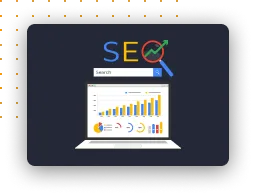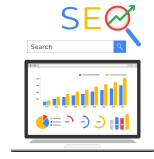Small business websites
In today's digital world, having a website is not just an option for small businesses—it's a necessity. Websites serve as the digital storefront for your business, offering a platform where potential customers can learn about your products and services at any time of day. For small enterprises, a website is not just about selling products; it's about building credibility, enhancing customer service, and expanding market reach.
Importance of having a website in today's business environment
The digital landscape has transformed how customers interact with businesses. A website can be your first point of contact with potential customers. It not only introduces your business to the global market but also sets the tone for your brand's image and values.
Benefits of websites for small businesses
A well-designed website offers myriad benefits:
- Accessibility: Keeps your business accessible around the clock, across the globe.
- Marketing: Acts as a core component of your marketing strategy, from SEO to social media integration.
- Sales: Opens up new sales channels through e-commerce. Customer Engagement: Provides a platform for engaging with customers directly, through blogs, forums, and feedback mechanisms.
Planning your small business website
Before you begin building your website, you need to plan meticulously to ensure that it aligns with your business goals and appeals to your target audience.
Defining your website's goals
Start by defining clear, actionable goals. Whether it's increasing product sales, generating leads, or improving customer support, your website's objectives should directly contribute to your overall business strategy.
Understanding your target audience
Knowing who your customers are and what they need from your website is crucial. This understanding will guide the design, content, and functionality of your site to better serve your audience.
Selecting the right domain name
Your domain name should be memorable, easy to type, and reflective of your brand. It’s one of the first interactions a customer will have with your online presence, so make it count.
Designing your small business website
The design of your website is pivotal in how effectively it converts visitors into customers. It should not only look professional but also be functional and user-friendly.
Key elements of effective web design
Include:
- Simplicity: Keep the design simple, clean, and focused.
- Navigation: Ensure it's easy for visitors to find what they're looking for with a well-organized menu.
- Branding: Your website should be an extension of your brand with consistent use of colors, logos, and styles.
User-Friendly navigation
A site with intuitive navigation ensures visitors spend more time engaging with your content, which increases the likelihood of converting them into customers.
Incorporating branding into design
Your brand’s identity should be evident in every aspect of your website’s design. Consistency in colors, logos, and messaging reinforces your brand and helps build trust with visitors.
Content creation for small business websites
Content is king in the digital marketing realm. The quality, relevancy, and frequency of your content can significantly impact your website's visibility and user engagement.
Types of content that drive engagement
Create a mix of blogs, videos, infographics, and downloadable content to engage different segments of your audience.
Creating quality content consistently
Consistency is key in content creation. Regular updates keep your website fresh and give visitors a reason to return.

SEO best practices for content
Optimize your content with targeted keywords, meta descriptions, and tags to improve your site’s SEO, helping it rank higher in search engine results.
Choosing the right technology and platform
The technology behind your website affects its performance, scalability, and ability to update. Choose a platform that fits your budget, technical skills, and business needs.
Comparing website builders vs. custom development
Website builders like Wix or Squarespace offer a user-friendly interface and quick setup at a lower cost, whereas custom development allows for more tailored features and scalability but at a higher investment.
Essential features your website must have
Include:
- Responsive design: Ensures your site is accessible on all devices.
- SEO capabilities: Features that help you optimize your site for search engines.
- Security features: Protect your site and customers' information with up-to-date security protocols.
Mobile optimization: why It’s critical
With more than half of all internet traffic coming from mobile devices, having a mobile-optimized website is essential. It ensures that users have a good experience no matter how they access your site.
Implementing E-commerce solutions
If selling products or services is a goal for your website, integrating e-commerce capabilities is essential.
Integrating E-commerce into your website
Choose an e-commerce platform that integrates seamlessly with your website and offers a smooth shopping experience for your customers.
Best practices for E-commerce usability
Ensure your online store is user-friendly, with clear product descriptions, high-quality images, and an easy checkout process.
Secure payment gateways
Security is paramount in e-commerce. Use trusted payment gateways to protect customers' payment information and to build trust in your site.
Utilizing SEO to increase visibility
SEO is a powerful tool to increase your website’s visibility and attract more visitors.
Fundamental SEO techniques for small businesses
Implementing basic SEO strategies such as keyword optimization, meta tagging, and backlinking can significantly improve your site's visibility.
Local SEO strategies
For small businesses, local SEO is crucial. Optimize your site for local search queries to attract nearby customers.
Measuring SEO success
Use tools like Google Analytics to track your SEO progress and make data-driven decisions to further improve your strategies.
Leveraging social media integration
Social media can significantly increase your website’s reach and attract more traffic.
Benefits of social media links and feeds
Integrating social media links and feeds on your website helps increase engagement and keeps content dynamic and fresh.
Using social media to drive traffic
Promote your content on social media platforms to drive traffic back to your website. Use targeted ads to reach specific demographics and increase visibility.
Website maintenance and updates
Maintaining your website is crucial to ensure it remains effective and secure over time.
Regular updates and their importance
Regular updates to content, design, and technology keep your website relevant and improve user experience.
Keeping your website secure
Security should be a priority for any business website. Regularly update security features and monitor your site for any potential vulnerabilities.
Analyzing website performance metrics
Tools like Google Analytics provide valuable insights into your website’s performance, helping you make informed decisions about updates and improvements.
Marketing your website
A strategic approach to marketing your website will help you reach a wider audience and achieve your business goals.
Effective digital marketing strategies
Utilize SEO, social media, email marketing, and online ads to promote your website and attract more visitors.
Email marketing integration
Collect email addresses through your website and use email marketing to keep in touch with customers, promote new content, or offer special deals.
PPC and advertisements
Pay-per-click advertising can be a cost-effective way to drive targeted traffic to your website, especially when you're looking to quickly boost visibility.
Common challenges and solutions
Running a website isn’t without its challenges, but with the right strategies, you can overcome them effectively.
Overcoming technical challenges
Technical issues can deter visitors. Ensure you have reliable hosting and access to technical support to resolve any issues swiftly.
FAQs on building a small business website
- What are the first steps in creating a small business website?
- How much should I budget for my small business website?
- How can I attract more visitors to my small business website?
- What are the best tools for building a small business website?
- How often should I update my small business website?
Building and maintaining a small business website is no small feat, but with the right approach, it can significantly enhance your business's visibility and growth. Remember, your website is often the first point of contact between your business and potential customers, so making a good impression is crucial. Regular updates, a focus on SEO, and effective integration with digital marketing strategies are key to creating a successful online presence that supports your business objectives.
Contact Us
(+44) 03308080546
Send use a Message
Request a Free quotation





